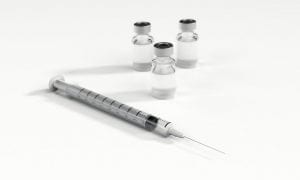Welcome to Study of the Week from Patient Worthy. In this segment, we select a study we posted about from the previous week that we think is of particular interest or importance and go more in-depth. In this story we will talk about the details of the study and explain why it’s important, who will be impacted, and more.
If you read our short form research stories and find yourself wanting to learn more, you’ve come to the right place.

This week’s study is…
Malignancy and immune disorders in patients with hereditary angioedema
We previously published about this research in a story titled “Does HAE Predispose People to Cancer?” which can be found here. The study was originally published in the journal Allergy, Asthma, & Clinical Immunology. You can view the full text of the study here.
What Happened?
In the past, some research has suggested that patients living with hereditary angioedema (HAE) often have a history of cancer. Prior studies have also drawn a connection between acquired angioedema (AAE) and increased cancer risk. Hereditary angioedema is commonly linked to C1 inhibitor dysfunction, which has been shown to be related to cancers and immune disorders. In this study, researchers evaluated the presence of cancer in 49 patients living with hereditary angioedema in order to see if they have a higher than expected prevalence of cancer.
After reviewing the medical histories of the 49 patients, the scientists found six with a history of cancer. One had cervical dysplasia, another had melanoma, one had kidney cancer, one had pancreatic cancer, and two had breast cancer. They also found six patients that had other immune disorders, including rheumatoid arthritis, Sjogren’s syndrome, chronic urticaria, and ulcerative colitis. In all but one of the patients, the cancer cases occurred in individuals that were at least 50 years old, and in three instances the cancer was diagnosed before hereditary angioedema had been.
While the researchers emphasize that this review of data alone does not demonstrate that hereditary angioedema increases cancer risk (as the sample size was quite small and there was also no control group used for comparison), the results still suggest that there should be further research into this subject. In addition, more research should be conducted in order to determine if the disorder also results in an increased risk of other immune diseases, such as those that were identified in this study.
About Hereditary Angioedema (HAE)
Hereditary angioedema is a genetic disorder which is characterized by chronic episodes of swelling that can affect multiple areas of the body. The condition is caused by mutations affecting the SERPING1 gene. Swelling attacks generally occur every two weeks or so; they can usually last for several days. Swelling may affect the limbs, digestive tract, face, and airway, with blockage of the airway being the most dangerous complication. Vomiting and abdominal pain may accompany attacks as well if the digestive tract is involved. Treatment involves reducing the likelihood for attacks to appear and preventing them from worsening when they do. Hereditary angioedema is typically only life-threatening if left untreated. Prevalence of the condition is estimated to be around one in 10,000 to one in 50,000, at least in the US and Canada. To learn more about hereditary angioedema, click here.
Why Does it Matter?
While this is not the decisive study that is needed to truly demonstrate scientifically that hereditary angioedema increases risk of cancer, the findings from this study should still sound an alarm bell for researchers that this matter is something that needs to be investigated. After all, it could have major implications for how hereditary angioedema patients are monitored and treated—if this rare disease increases cancer risk, than physicians needs to be on the lookout for signs of malignancy during routine check ups and appointments. Future study in this area is essential for improving outcomes for hereditary angioedema patients.
“As HAE and AAE can present very similarly, we would advocate that older patients with malignancy who develop C1 inhibitor deficiency and angioedema, a high index of suspicion of HAE should be maintained as this could potentially identify relatives with undiagnosed HAE.”
These results raise questions particularly for patients that are 50 or more years old. Since hereditary angioedema is not always diagnosed until later in life, doctors whose cancer patients or immune disorder patients begin experiencing signs of edema (swelling, the most characteristic symptom of hereditary angioedema), should have reasonable suspicion to believe that the disorder may be present. A diagnosis could be confirmed by conducting a genetic test in order to detect mutations linked to hereditary angioedema.
“Although we are limited by our small sample size and lack of a control population, based on these findings we would recommend that physicians managing HAE patients should maintain a high index of suspicion of co-existing malignancy and immune disorders.”






